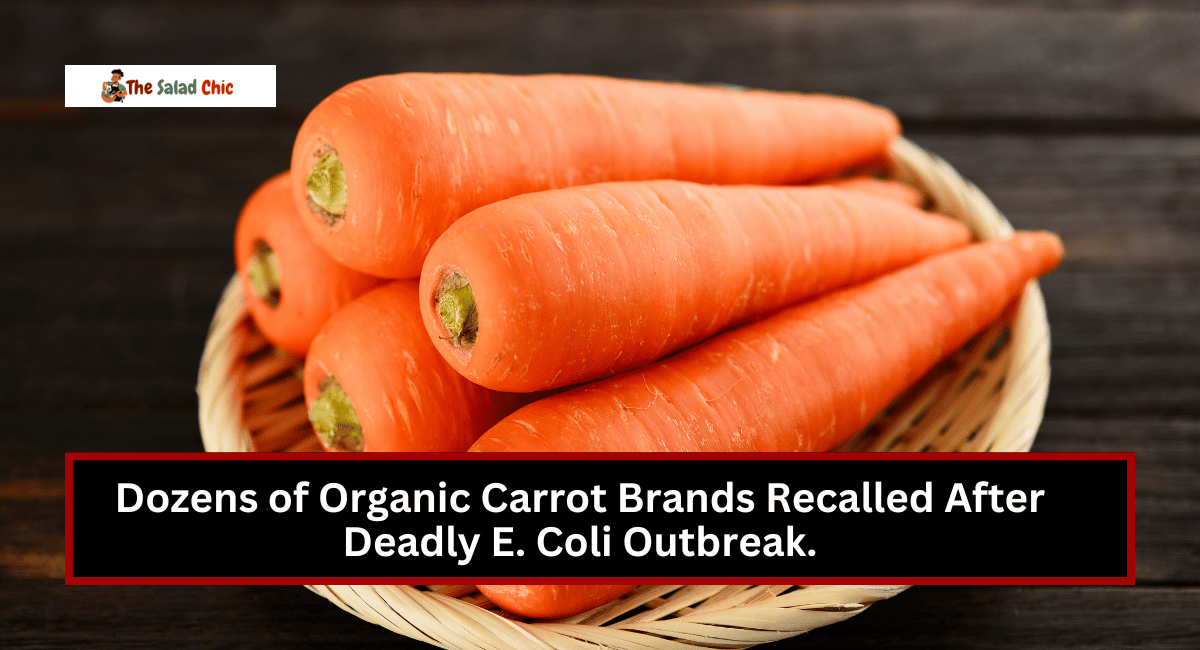A dangerous outbreak of E. coli infections has been traced to organic carrots, prompting a nationwide recall of dozens of brands.
As of November 17, 2024, one person has tragically died, and 15 others have been hospitalized. Here’s everything you need to know about the outbreak, the recalled products, and how to protect your family.
The Outbreak at a Glance
The FDA (Food and Drug Administration) and CDC (Centers for Disease Control and Prevention) are investigating an outbreak of E. coli O157
infections linked to organic whole and baby carrots. So far:
- Thirty-nine confirmed cases have been reported across 18 states.
- Patients became ill between September 6 and October 28, 2024.
- One death has been confirmed, and 15 patients required hospitalization.
- The outbreak has been linked to carrots supplied by Grimmway Farms, a major distributor.
States Affected
Cases have been reported in
- Arkansas, California, Colorado, Massachusetts, Michigan, Minnesota, Missouri, North Carolina, New Jersey, New York, Ohio, Oregon, Pennsylvania, South Carolina, Texas, Virginia, Washington, and Wyoming.
Brands and Products Recalled
Grimmway Farms has recalled 35 brands of organic carrots sold under various labels at major retailers such as Walmart, Kroger, Whole Foods, Target, Sprouts, and more.
Recalled Whole Carrot Brands
The following brands of organic whole carrots were available from August 14 to October 23, 2024:
- 365
- Bunny Luv
- Cal-Organic
- Compliments
- Full Circle
- Good & Gather
- GreenWise
- Marketside
- Nature’s Promise
- O Organic
- President’s Choice
- Simple Truth
- Trader Joe’s
- Wegmans
- Wholesome Pantry
Recalled Baby Carrot Brands
The organic baby carrots have best-if-used-by dates ranging from September 11 to November 12, 2024, and include brands such as:
- Bunny Luv
- Kroger
- LIDL
- Raley’s
- Sprouts
- Trader Joe’s
Consumers are advised to check their refrigerators and freezers for these products and discard them immediately.
How the Outbreak Was Identified
The FDA’s traceback investigation pinpointed Grimmway Farms as the standard supplier of the contaminated carrots. The farm initiated a recall on November 16, 2024, and notified distributors and retailers nationwide.
Although the recalled products are no longer available for sale, carrots can last for months when refrigerated or frozen. Therefore, consumers must double-check their supplies.
Symptoms of E. Coli Infections
E. coli infections can cause a wide range of symptoms, including:
- Severe stomach cramps
- Diarrhea (often bloody)
- Fever
- Nausea and fatigue
Symptoms typically appear 3 to 4 days after consuming contaminated food and may last 5 to 7 days.
Serious Complications: Hemolytic Uremic Syndrome (HUS)
In about 5-10% of cases, patients develop a life-threatening complication called Hemolytic Uremic Syndrome (HUS). Symptoms of HUS include:
- Fever and abdominal pain
- Extreme tiredness
- Reduced urination
- Bruising or unexplained bleeding
- Pale skin
Children under five, older adults, and individuals with weakened immune systems are most at risk. If you experience symptoms of HUS, seek emergency medical care immediately.
What to Do if You’ve Eaten Recalled Carrots
If you suspect you’ve consumed any of the recalled carrots, monitor yourself for symptoms of E. coli infection. If symptoms develop:
- Seek medical attention.
- Inform your doctor about potential exposure to E. coli.
- Request diagnostic tests specific to E. coli infections.
Early treatment is crucial, especially for vulnerable individuals.
Why the Outbreak Might Be Larger
The CDC estimates that for every confirmed case of E. coli, 26 cases go unreported. This means the actual number of patients could be much higher. Many individuals may not seek medical care or undergo specific testing for E. coli.
How to Stay Safe
To protect yourself and your family:
- Check your refrigerator and freezer for recalled carrots and dispose of them immediately.
- Wash your hands, cutting boards, and kitchen surfaces thoroughly after handling carrots or other produce.
- Cook carrots thoroughly to kill potential bacteria.
Conclusion
This outbreak highlights the importance of food safety and vigilance. If you’ve recently purchased organic carrots, check your supply and discard any recalled products. Stay informed and seek medical care if you experience symptoms of E. coli infection.
By taking the proper precautions, you can protect your health and prevent the spread of this dangerous bacteria.
FAQs
What should I do if I have recalled carrots in my fridge?
Dispose of them immediately in a sealed bag to prevent contamination. Clean your refrigerator and any surfaces that come into contact with the carrots.
Can cooking carrots kill E. coli bacteria?
Cooking carrots at high temperatures (above 160°F) can kill E. coli bacteria. However, it’s safer to discard any recalled products.
What are the early symptoms of an E. coli infection?
Early symptoms include stomach cramps, diarrhea (which may be bloody), and fatigue. Symptoms usually appear 3 to 4 days after exposure.
Are certain groups more at risk?
Yes, young children, older adults, and people with weakened immune systems are more likely to develop severe complications like HUS.
Can E. coli infections be treated?
Most infections resolve on their own within a week. However, severe cases, especially those involving HUS, require hospitalization and specialized care.
READ MORE: Danone Offers $307M for Lifeway Foods kefir.

